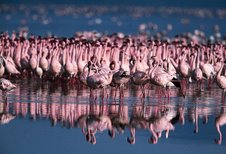The history of Tanzania is filled with stories of struggle and
triumph, victory and peace. This rich history can be traced as far as;
from the beginning of human settlement and Tribal Habitation to the
beginnings of trade and merchant states along the Swahili Coast. Rich
traces also include the arrival of colonialism and the advent of
independence while political details and the modern Tanzania are not to
be ignored.
Tanzania has a long history of human habitation – some of the
earliest hominoid fossils in the world were discovered in Olduvai Gorge
and show records of hominoid habitation in the region going back at
least 3 million years. It is thought that early hunter-gatherer
communities inhabited the northern highlands as far back as 10,000 years
ago and remained largely isolated until the arrival of
Cushitic-speaking tribes from the north, who brought basic agricultural
technologies to the area between 3,000 and 5,000 years ago.
More recent migrations of Bantu-speaking tribes from western Africa
began around 1000 BC, and with their assimilation came advances in iron
and steel production. Ancestors of the Maasai arrived more recently,
beginning their migration around the 15th century and continuing to
arrive from the area around southern Sudan for another three hundred
years. Battles over grazing and agricultural land began as ethnic groups
consolidated and appropriated loose borders and tribal regions.
Trade routes that led from the heart of the continent to the East
African coast gradually gave rise to Swahili culture – a blend of Arab,
Indian and Bantu influences that created one of the most developed trade
networks in the Indian Ocean.
Although archaeological evidence shows the area was used as a trading
port for Greek and Persian ships as early as 400 BC, permanent coastal
settlements only developed around 800 AD, when civilizations around the
Indian Ocean were wealthy enough to support annual voyages and a high
volume of trade.
With large caravans laden with gold, spices, ivory, and slaves
departing from Zanzibar, Kilwa, and other less prominent East African
ports, Swahili civilization grew and flourished until the 15th century,
when trade became more confined to Mombasa and Zanzibar.
Portuguese traders dominated the East African coast from 1525 until
the early 18th century, when Omani Arabs once again regained control of
the slave trade. The first missionaries journeyed to the mainland in the
early 19th century and settlements, mission stations, and trading posts
were built as far inland as Lake Tanganyika.
In the late 19th century, the German East African Company gained
control of large portions of the Tanzanian mainland, although the
British held a sphere of influence over the Omani sultans ruling the
Zanzibar Archipelago. By 1891, most of mainland Tanzania was under the
colonial administration of German East Africa.
At the end of World War I, the Germans relinquished control over the
area and handed it over to British administration that governed by a
system of indirect rule.
A fledgling national movement in opposition to colonial economic
policies was founded in the 1930’s and by the early 1950’s; the movement
came into its own. In 1954, an internal constitution was drawn up and
resistance unified under the Tanganyika African National Union (TANU)
with Julius Nyerere elected as its president.
After further elections in 1959, Britain established an internal
self-government within the country and by 1962 the independent Republic
of Tanganyika was formed with Nyerere as president.
Meanwhile, a popular revolution on the island of Zanzibar ousted the
Omani sultan and in 1963, the archipelago gained its independence from
British influence and Arab rule. One year later, leaders Nyerere and
Karume, the first president of Zanzibar, signed an act of union to
create the United Republic of Tanzania, which includes the Republic of
Tanganyika and the Revolutionary Government of Zanzibar.
Today, Tanzania is a sovereign state under the ruler- ship of His Excellency president Jakaya Kikwete
PKP. safaris in kenya desk.
Natural Track Safaris
Subscribe to:
Post Comments (Atom)









No comments:
Post a Comment